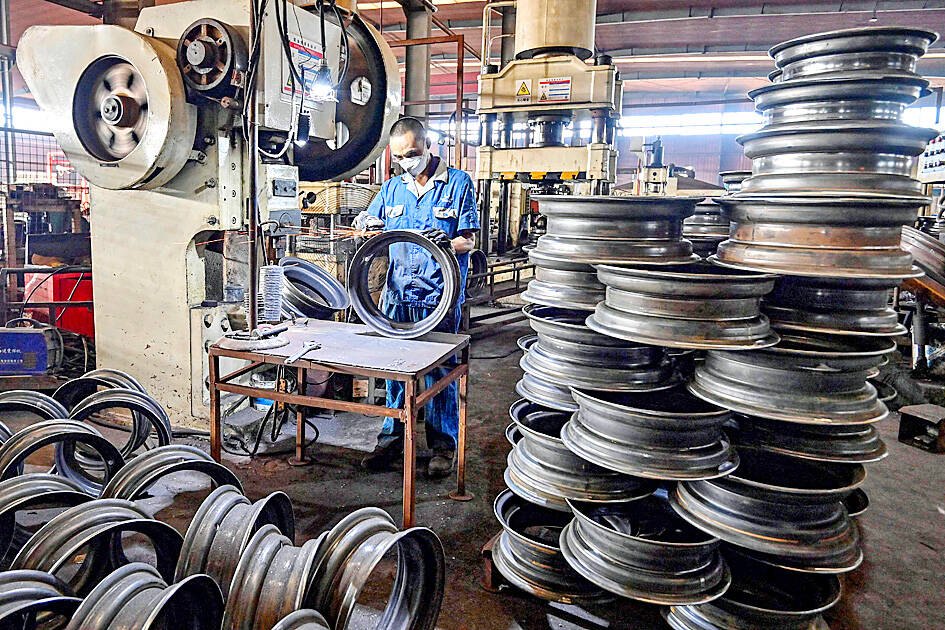Profits at China’s industrial firms fell at the sharpest pace since April last year, dragged down by weaker manufacturing as part of an economic slowdown that is now prompting extraordinary stimulus efforts.
Industrial profits at large Chinese companies decreased 17.8 percent on an annual basis last month, after a 4.1 percent gain in July, the Chinese National Bureau of Statistics (NBS) said in a statement yesterday.
Earnings growth grew 0.5 percent to 4.65 trillion yuan (US$663 billion) in the first eight months compared with the same period last year.

Photo:AFP
Bloomberg Economics had forecast a deceleration to 3.6 percent last month, but expected growth to stay steady in the January-to-August period relative to the first seven months of the year. The figures are a key gauge of measuring the financial health of factories, mines and utilities that can affect their investment decisions in the months to come.
The NBS blamed last month’s slowdown — the first drop in five months — on a lack of market demand, the effect of high temperature and floods in some areas, as well as a high base of comparison.
“Domestic consumer demand is still weak, the external environment is complex and changeable, and the foundation for the recovery of industrial profit still needs to continue to consolidate,” NBS statistician Yu Weining (于衛寧) said in a statement accompanying the release.
The latest reading came against the backdrop of a slower-than-expected increase in industrial output last month, when it extended a weakening streak to the longest in almost three years.
The slowdown became more apparent during a weak earnings season that showed little sign of any imminent recovery in consumption.
Thinner profit margins reflect the frailty of the broader Chinese economy in the absence of stronger domestic demand. Underscoring the drag on earnings, producer prices have been falling since late 2022, intensifying fears that deflation was becoming entrenched in China.
With signs mounting that the world’s second-largest economy risked missing Beijing’s goal of growing about 5 percent, the government pivoted this week and unveiled a broad package of stimulus measures to revive growth.
The country’s top leadership also used its monthly huddle to call for stronger fiscal support and other steps that signaled a growing urgency to arrest the slowdown.

Anna Bhobho, a 31-year-old housewife from rural Zimbabwe, was once a silent observer in her home, excluded from financial and family decisionmaking in the deeply patriarchal society. Today, she is a driver of change in her village, thanks to an electric tricycle she owns. In many parts of rural sub-Saharan Africa, women have long been excluded from mainstream economic activities such as operating public transportation. However, three-wheelers powered by green energy are reversing that trend, offering financial opportunities and a newfound sense of importance. “My husband now looks up to me to take care of a large chunk of expenses,

SECTOR LEADER: TSMC can increase capacity by as much as 20 percent or more in the advanced node part of the foundry market by 2030, an analyst said Taiwan Semiconductor Manufacturing Co (TSMC, 台積電) is expected to lead its peers in the advanced 2-nanometer process technology, despite competition from Samsung Electronics Co and Intel Corp, TrendForce Corp analyst Joanne Chiao (喬安) said. TSMC’s sophisticated products and its large production scale are expected to allow the company to continue dominating the global 2-nanometer process market this year, Chiao said. The world’s largest contract chipmaker is scheduled to begin mass production of chips made on the 2-nanometer process in its Hsinchu fab in the second half of this year. It would also hold a ceremony on Monday next week to

TECH CLUSTER: The US company’s new office is in the Shalun Smart Green Energy Science City, a new AI industry base and cybersecurity hub in southern Taiwan US chip designer Advanced Micro Devices Inc (AMD) yesterday launched an office in Tainan’s Gueiren District (歸仁), marking a significant milestone in the development of southern Taiwan’s artificial intelligence (AI) industry, the Tainan City Government said in a statement. AMD Taiwan general manager Vincent Chern (陳民皓) presided over the opening ceremony for the company’s new office at the Shalun Smart Green Energy Science City (沙崙智慧綠能科學城), a new AI industry base and cybersecurity hub in southern Taiwan. Facilities in the new office include an information processing center, and a research and development (R&D) center, the Tainan Economic Development Bureau said. The Ministry

Nvidia is to open a quantum computing research lab in Boston, where it plans to collaborate with scientists from Harvard University and the Massachusetts Institute of Technology, Nvidia CEO Jensen Huang (黃仁勳) said on Thursday. Huang made the announcement at Nvidia’s annual software developer conference in San Jose, California, where the company held a day of events focused on quantum computing. Nvidia added the program after Huang in January said that useful quantum computers are 20 years away, comments that he sought to walk back on Thursday while joined onstage by executives from quantum computing firms. “This is the first event in history